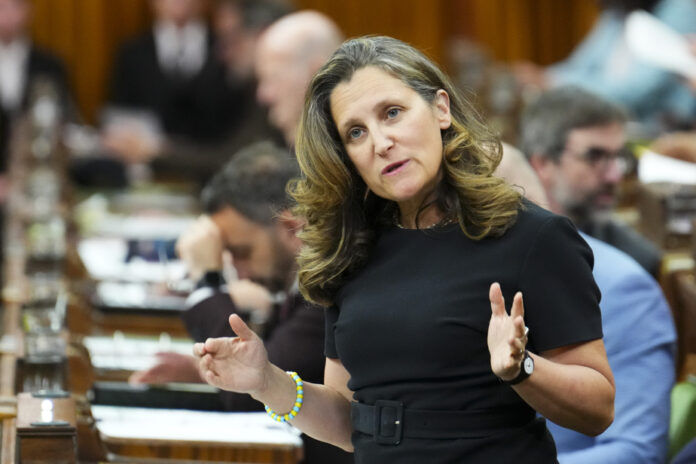(Ottawa) The warnings are multiplying in Canada and the United States. But that doesn’t seem to be swaying Finance Minister Chrystia Freeland, who is reiterating her strong desire to move forward with a digital services tax next January.
In doing so, Canada risks going it alone, because the other OECD member countries – including the United States – decided a few weeks ago to put on ice the idea of imposing such a tax which could reach 15%.
Organizations representing the business community in Canada and the United States have called on the Trudeau government to reverse the decision, fearing it could cause unnecessary trade tensions between the two countries.
Recently, U.S. Ambassador to Canada David Cohen signaled that the Biden administration will have no choice but to impose retaliatory measures if the Trudeau government does not change its tune. in this file.
The latter recalled that the Secretary of State for Commerce, Katherine Tai, had also been unequivocal on this subject in the exchanges she had with her Canadian counterparts.
In a statement provided to La Presse, Minister Freeland’s office said Canada believes it is important to ensure that large corporations pay their fair share of taxes in the countries where they do business.
“A multilateral agreement has always been Canada’s priority and preference. Canada strongly supports international efforts to end the race to the bottom and to ensure that all corporations, including the world’s largest corporations, pay their fair share,” said Katherine Cuplinskas, Senior Advisor and Press Secretary to Minister Freeland.
According to our information, the Minister of Finance also intends to table a bill in the House of Commons to implement this famous tax. Everything indicates that this bill will obtain the support of the New Democratic Party, which has reached an agreement ensuring the survival of the Liberal Party, which is a minority in the Commons during the votes of confidence.
A government source also argued that the Trudeau government had expressed its intention to impose such a tax in 2022 when presenting the economic and financial update. And the Liberals also campaigned for this tax in the 2021 federal election.
“There are countries that already had a digital services tax before the OECD-wide negotiations, such as France, Italy and India. And these countries continue to impose this tax even if it has been decided to postpone the talks for a year, ”argued this government source, who requested anonymity.
In recent weeks, the Business Council of Canada and the powerful United States Chamber of Commerce have publicly called on Minister Freeland to reverse her decision. Especially since this measure must come into force at the beginning of 2024, at the very moment when the electoral cycle of the presidential election in the United States begins. Presidential campaigns give rise to protectionist proposals from aspiring candidates.
Robert Asselin, senior vice-president of the Business Council of Canada and former close associate of former finance minister Bill Morneau, maintains that the Trudeau government is about to make “an unnecessary gesture of provocation.”
“This is an unnecessary provocative move that will be retaliated against by our largest trading partner. And multilaterally, the OECD process is not over. Why not complete it and make the necessary decisions afterwards? All because the government is desperate for revenue. It is not in Canada’s national interest to offend Americans on the eve of the renegotiation of CUSMA [new free trade agreement between Canada, the United States and Mexico],” argued Mr. Asselin.















